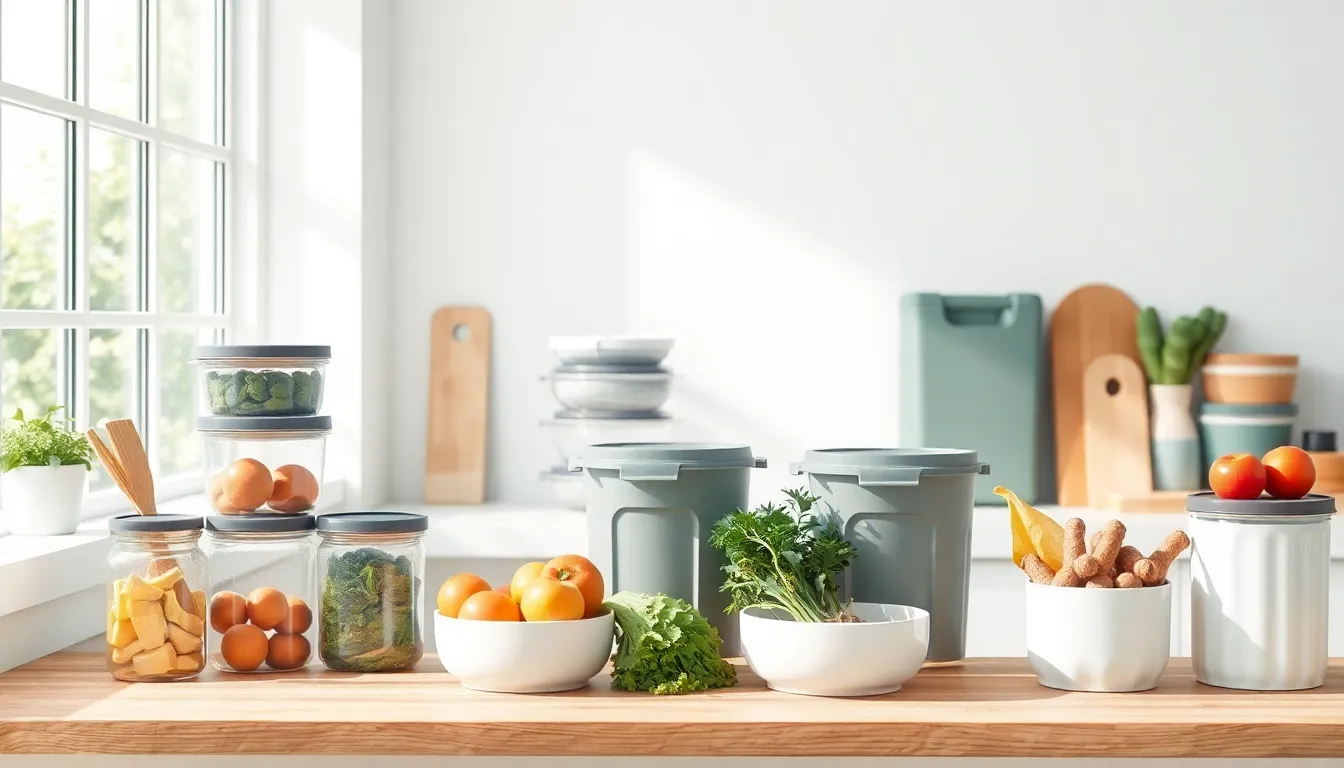Imagine whipping up a gourmet meal while saving the planet—sounds like a superhero’s dream, right? Welcome to the world of a zero waste kitchen, where culinary creativity meets eco-friendly living. It’s not just about turning leftovers into gourmet delights; it’s a lifestyle that transforms your kitchen into a waste-free wonderland.
Zero Waste Kitchen
A zero waste kitchen embodies a lifestyle that prioritizes waste reduction and sustainability during food preparation and storage. It focuses on minimizing trash by utilizing reusable items, composting organic waste, and choosing products with minimal packaging. This approach not only helps the environment but also encourages creativity in meal preparation.
Reusable containers, cloth bags, and stainless steel utensils serve as essential tools in a zero waste kitchen. By opting for these alternatives, individuals significantly decrease their reliance on single-use plastics. Composting scraps from fruits, vegetables, and other organic materials contributes to healthier soil, promoting a closed-loop system.
Shopping in bulk reduces unnecessary packaging while also allowing for customized quantities of ingredients. Local farmers’ markets often provide fresh, seasonal produce without excessive plastic wrapping. Emphasizing whole foods over processed options further aids in reducing waste.
Meal planning plays a crucial role in minimizing food waste. By preparing a shopping list based on planned meals, individuals avoid impulse purchases that often result in forgotten items going bad. Utilizing leftovers creatively transforms potential waste into delicious new dishes.
Ultimately, a zero waste kitchen cultivates a mindful approach toward consumption. It’s about making conscious choices that foster environmental responsibility and promote healthy living. Prioritizing sustainability in food preparation and consumption creates a positive impact, leading to lasting change.
Benefits of a Zero Waste Kitchen

A zero waste kitchen offers numerous advantages that extend beyond personal convenience. Environmental and financial benefits play vital roles in this sustainable lifestyle.
Environmental Impact
Minimizing waste significantly reduces landfill contributions. Composting organic materials lowers greenhouse gas emissions and enriches soil health. Using reusable containers cuts back on single-use plastic pollution, which harms wildlife. Choosing products with minimal packaging encourages manufacturers to adopt more sustainable practices. Sourcing food locally supports regional economies while decreasing transportation emissions. Overall, a zero waste kitchen actively participates in promoting environmental health and fostering resource conservation.
Financial Savings
Cutting waste also leads to substantial financial savings. Purchasing in bulk often results in lower prices per item, reducing grocery bills. Planning meals decreases the likelihood of food spoilage, preventing unnecessary costs. Investing in high-quality reusable products yields long-term savings compared to frequently replacing disposable items. By creating a zero waste kitchen, individuals find effective ways to manage their budget while supporting eco-friendly choices. In this way, financial and environmental benefits become intertwined, enhancing an individual’s overall quality of life.
Key Principles of a Zero Waste Kitchen
A zero waste kitchen embraces resourcefulness, prioritizing waste reduction through specific practices. Adopting these principles leads to a more sustainable and eco-friendly culinary environment.
Refuse
Refusing unnecessary items reduces waste significantly. He or she can start by declining plastic bags at stores while opting for reusable alternatives. Avoiding single-use products like straws and utensils directly eliminates excess waste. Choosing to say no to promotional items and freebies also cuts down on clutter. It’s essential to cultivate a mindset focused on intentional purchases, leading to a streamlined kitchen.
Reduce
Reducing consumption plays a vital role in minimizing waste. Individuals can prioritize buying in bulk to decrease packaging waste from individual items. Selecting products with minimal packaging or no packaging contributes to less trash in the home. Cooking only what is needed prevents uneaten food from ending up in the garbage. Meal planning can effectively limit impulse purchases, ensuring that every bought item gets used.
Reuse
Reusing items instead of disposing of them fosters sustainability. Glass jars can serve as storage for dry goods or leftovers, offering a practical alternative to single-use containers. Cloth napkins replace paper towels, reducing the need for disposables. Individuals might repurpose old containers for organizing pantry items or use cloth bags for shopping. Each act of reusing helps extend the lifespan of materials, significantly impacting overall waste reduction.
Recycle
Recycling remains a key component of responsible waste management. He or she should stay informed about local recycling guidelines to ensure proper disposal of materials. Food scraps can be composted, transforming organic waste into nutrient-rich soil. Glass, metal, and certain plastics can be recycled, diverting items from landfills. Educating oneself on recyclable materials maximizes efficiency in recycling efforts, contributing to a sustainable kitchen environment.
Essential Tools for a Zero Waste Kitchen
Creating a zero waste kitchen requires specific tools that support sustainability. Reusable containers play a vital role in storing food and leftovers efficiently. Glass or stainless steel options minimize plastic waste and preserve food quality.
Cloth bags are essential for grocery shopping. Using these bags eliminates the need for single-use plastic bags. They’re also suitable for storing bulk items like grains and nuts.
Stainless steel utensils stand out for their durability and lack of plastic components. Investing in high-quality kitchen tools further reduces waste over time.
Composting bins help manage organic waste effectively. They transform food scraps into nutrient-rich soil, promoting an eco-friendly approach to disposal.
Choosing a meal prep station with reusable silicone food covers enhances food storage options. These covers reduce reliance on plastic wraps, keeping leftovers fresh without unnecessary waste.
A scale for portioning minimizes food waste during cooking. Weighing ingredients ensures precise amounts are used, cutting down on leftovers.
Buying in bulk is easier with a set of glass jars for storage. These jars facilitate purchasing less packaged food and help keep items organized.
Finally, an airtight compostable bag for collecting food scraps provides a convenient solution for kitchen waste. This bag reduces the chances of attracting pests while supporting eco-friendly practices.
With these essential tools, anyone can take significant steps towards achieving a zero waste kitchen while enjoying efficient and sustainable culinary practices.
Tips for Implementing a Zero Waste Kitchen
Adopting a zero waste kitchen requires commitment and creativity. Start by assessing current waste practices to identify areas for improvement. Use reusable containers for food storage. Choose glass or stainless steel options to promote sustainability and reduce plastic use.
Plan meals in advance. This approach minimizes impulse purchases and helps avoid food spoilage. Reusing glass jars for leftovers and pantry storage helps in maintaining organization while extending the lifecycle of containers.
Shop in bulk whenever possible. Bulk buying reduces packaging waste significantly and encourages purchasing only what is needed. Local farmers’ markets provide fresh, seasonal produce, minimizing transport emissions and supporting regional economies.
Implement composting practices for organic waste. Composting bins transform food scraps into nutrient-rich soil, contributing to responsible waste management. Using an airtight compostable bag for scraps ensures efficient collection.
Invest in cloth bags for grocery shopping. Doing so eliminates reliance on single-use plastic bags during trips to the store. Stainless steel utensils can replace disposable items and contribute to a waste-free cooking experience.
When dealing with food scraps, utilize reusable silicone food covers. They protect leftovers without generating more waste. A kitchen scale assists in portion control, reducing excessive food waste further.
Regularly reassess practices to maintain a zero waste environment. Adapting habits over time helps sustain the commitment to reducing waste. By integrating these tips into daily routines, creating a zero waste kitchen becomes attainable and rewarding.
Conclusion
Embracing a zero waste kitchen is a powerful step toward sustainable living. By implementing mindful practices and utilizing essential tools, individuals can significantly reduce their environmental footprint. This lifestyle not only benefits the planet but also enhances personal well-being through healthier eating habits and cost savings.
As they make conscious choices about food consumption and waste management, they foster a culture of sustainability in their homes and communities. Ultimately, adopting a zero waste kitchen is about creating lasting change that promotes a healthier planet for future generations. Every small effort contributes to a larger impact, making it a worthwhile endeavor for anyone looking to live more sustainably.

